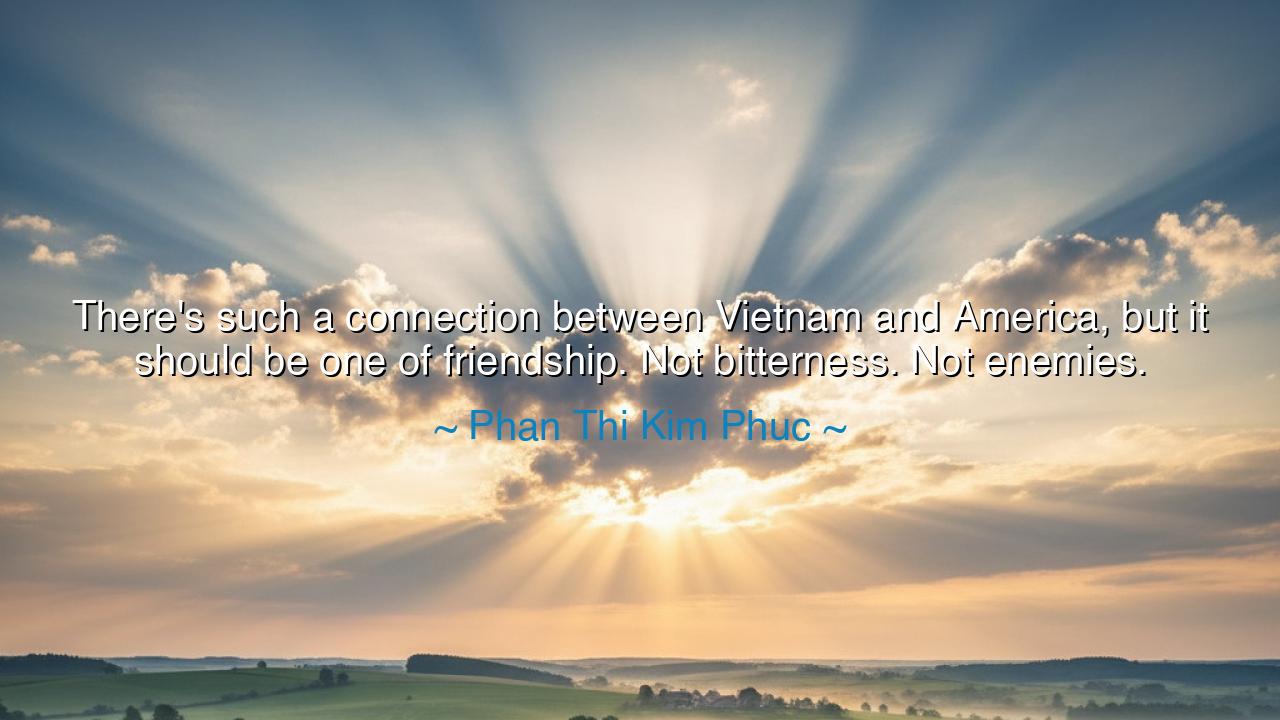
There's such a connection between Vietnam and America, but it
There's such a connection between Vietnam and America, but it should be one of friendship. Not bitterness. Not enemies.






“There’s such a connection between Vietnam and America, but it should be one of friendship. Not bitterness. Not enemies.” These are the words of Phan Thi Kim Phuc, the “Napalm Girl,” whose image once seared itself into the conscience of the world—a child running naked down a burning road, her skin aflame, her face twisted in pain. That single photograph captured the horror of war more deeply than any speech or treaty ever could. Yet from that agony, from those ashes, Kim Phuc’s spirit rose—not in hatred, but in forgiveness. Her words, spoken years after the fire that scarred her body, stand as a living testament to the power of reconciliation and the victory of love over vengeance.
In her statement, Kim Phuc reveals a truth as old as the human heart: that bitterness is a second fire, more enduring than the first. War destroys the flesh, but resentment poisons the soul. She, who had every right to hate, chose instead the harder path—the way of friendship. To her, the bond between Vietnam and America is not merely one of history or tragedy; it is a bond of humanity, born through shared suffering. The rivers of blood that once divided them now call both nations to peace. For those who have seen the face of war, the greatest courage is not to fight again—but to forgive.
In ancient times, when two warriors laid down their swords after years of battle, they would clasp hands and build temples to peace upon the very fields that once ran red with their blood. So too must nations and people who once clashed turn their wounds into bridges. The connection between Vietnam and America is not one that can be severed, for it was written in pain and sacrifice. The challenge, as Kim Phuc reminds us, is to transform that connection from one of enemies into one of allies, from destruction into healing, from memory into meaning.
Consider the meeting of John McCain, an American pilot once imprisoned in Hanoi, and his former captors decades later. McCain, who endured years of torture, did not return to curse the land of his suffering. Instead, he returned as a peacemaker, working tirelessly to restore diplomatic ties between the two nations. He walked among the people who had once been his jailers and extended his hand. In that gesture, he embodied the spirit of Kim Phuc’s words: that friendship born from pain is stronger than friendship born from convenience. Such reconciliation does not erase the past—it redeems it.
Kim Phuc’s message also speaks to every human heart. For who among us has not known hurt, betrayal, or misunderstanding? We carry within us our own small wars—against friends, families, or strangers. And yet, what if we, like her, chose not to be prisoners of the past? What if we turned our bitterness into compassion, our memories of injury into lessons of mercy? Each act of forgiveness, however small, heals a fragment of the world. In the silence that follows anger, peace begins its quiet work.
Her words remind us that enemies are often mirrors—reflections of fear, ignorance, and pride. When we meet those we once opposed with understanding, we begin to see not the enemy, but the human being. In this light, the scars of history become the roots of empathy. Vietnam and America, once divided by fire and ideology, now share trade, culture, and friendship. From that terrible war rose a generation that speaks not of hate, but of hope. This is how the human story advances—not through conquest, but through connection.
Let every person, then, remember Kim Phuc’s lesson: forgiveness is strength, and peace is the triumph of the human spirit. To forgive is not to forget—it is to release the chains that bind the heart. The practical path she offers is simple yet profound: when bitterness stirs within you, breathe; when anger tempts you to strike, pause; when you remember pain, answer it with understanding. Seek not vengeance, but friendship. Seek not enemies, but brothers.
For in the end, the flames that once consumed her village now illuminate the path of humanity itself. Kim Phuc, once a symbol of suffering, became a symbol of peace. Her words will echo through time, teaching future generations that though war divides, forgiveness unites, and that the truest connection between peoples—whether of nations or hearts—must always be one of friendship, not bitterness, not enemies.






AAdministratorAdministrator
Welcome, honored guests. Please leave a comment, we will respond soon